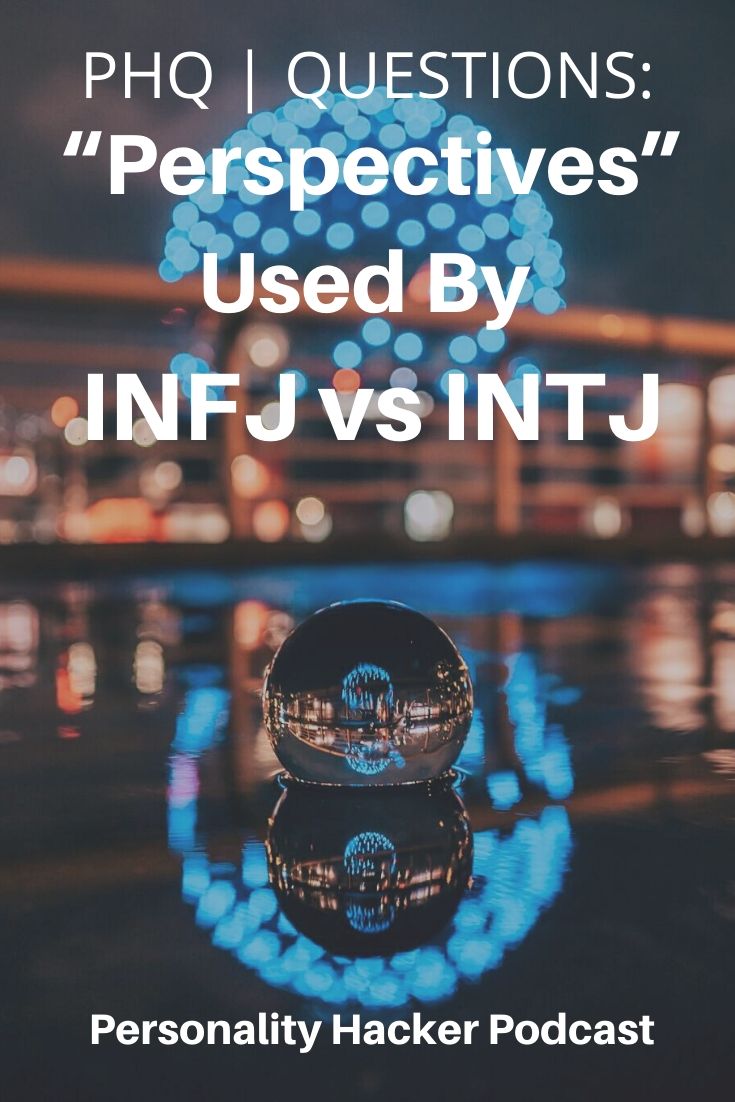Download Episode Here – right click link and select “Save Link As…”
PHQ | QUESTIONS FROM COMMUNITY: In this episode, Joel and Antonia answer a question about Introverted Intuition (“Perspectives”) being used by an INFJ vs INTJ.
To subscribe to the podcast, please use the links below:
Subscribe with iTunes
Non iTunes Link
Download The Android App
Subscribe on Soundcloud
Subscribe with Stitcher
If you like the podcast and want to help us out in return, please leave an honest rating and review on iTunes by clicking here. It will help the show and its ranking in iTunes immensely! We would be eternally grateful!
Want to learn more?
Discover Your Personal Genius
We want to hear from you. Leave your comments below…


Share:
PHQ | QUESTIONS: Can An INFP Be Friends With An ESTJ?
PHQ | QUESTIONS: Are INFJs The Rarest Type?
12 comments
I think you misunderstood our intent with the word “woo-woo.” I made sure to articulate my sentence carefully when talking about this: “INFJs are more attracted to things that other people may disregard as woo-woo.” That’s a sentence full of subjectivity, very much on purpose. Meaning – if you took a poll of how many INxJs are into a subject like, say, astrology you are likely to see some INTJs on board, but I’d wager you’d have a heavier dose of skeptics. Whereas the scales would more likely tip in the favor of interest or belief for INFJs. (Obviously I’m talking about trends, not rules.) This and other topics like it are subjects that are easily called “woo-woo,” though I may not agree with the word or sentiment.
I’m still trying to make out if your comment is one of echoing or umbrage with the podcast. Other than taking some exception to the specific words we used, I can’t really see where your comment disagrees with the content.
A
“Woo woo” and intuition are not synonymous. Extroverted iNtuition, perhaps, in the sense that S’s won’t take anyone seriously when they see N. Ne’s verbalize their discovery process, saying aloud what they don’t know as they explore it.
Ni’s don’t do that. We extrovert our judging function and judging, whether Te or Fe is going to sound a lot more like judgement than than exploration. INFJ has the problem that their F subject matter, people, values, relationships, is not testable. Its always conjectural. Not more abstract, more conjectural. We can’t look inside the relationship or someone’s head, so maybe what INFJ says, or maybe not. It can be hard to defend categorical statements about conjecture.
T has the advantage that its subject matter has various languages to employ, math, logic, science, that give us words to explain how we arrived at our conclusions. Having words, especially these kinds of words, makes it sound like you know what you are talking about. You prove things in logic and math, and you demonstrate things experimentally in science. The opposite of woo woo. But INTJ wanders off into conjecture as well, we have theories about all kinds of things, economics, politics, cosmology, the nature of matter. But talking about these things, no matter how conjectural, sound like academics or science. Someone asks, but how do you know, and we can cite sources and give examples. Even if the subject is a grand theory of social power, people don’t walk away saying “woo woo” they say, “smart”.
But its not because its more concrete, even though we can test some of our theories in the real world. Its because the subject of our NiTe interest, grand systems have the patina of math, logic, and science.
When an INTJ runs a business, they are concerned with the big picture. What is the purpose of this business, and then they begin to work from this idea into its implications. If the business is supposed to make money, we should have happy customers, products of high value and low costs. Now I know what to strive for. INTJ doesn’t care about the procedures of the staff unless and until it impacts on the big picture.
The concrete thinker starts with the procedures and doesn’t give much (or any) thought to the big picture. S’s never realize they are running their business as a hobby (something to keep them busy) rather than as a profit maximizing enterprise. They are too busy writing a list of things for the cashier to attend to all day.
Concrete thinking starts with the procedures and fewer and fewer S’s push into the big picture. As the picture gets bigger, there are fewer S’s there, this is the realm of the abstract. Its easy to presume you are running a profit maximizing enterprise when in fact you are managing the decline of the organization.
The thinking of NiTe is not less abstract than NiFe, but it often benefits from math, logic, and science to make it seem more certain, when in fact any Ni is concerned with conjectural possibilities. Dealing with the objectivity of reality is not less theoretical than the subjectivity of the person or a relationship, but it may appear testable in a way the other is not. Though in truth, what we are testing are not the theories themselves but the implications of these theories, so in that regard, the data rich approach merely conceals the subjectivity of the theorist. This is true in the hard sciences, and poses a major hurdle in the soft sciences. Economics is a data and number rich field, but the data never persuades economists away from their prior commitments, it only gets interpreted to support their prior commitments.